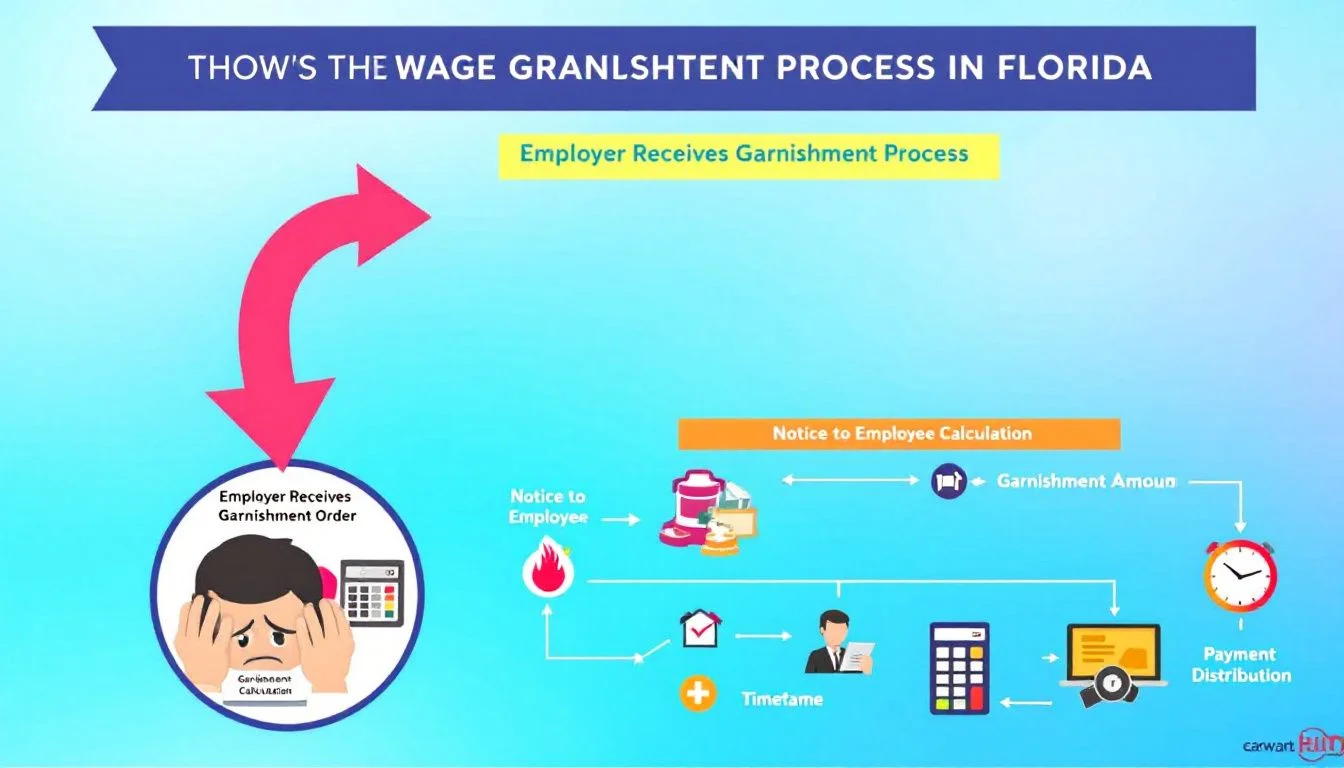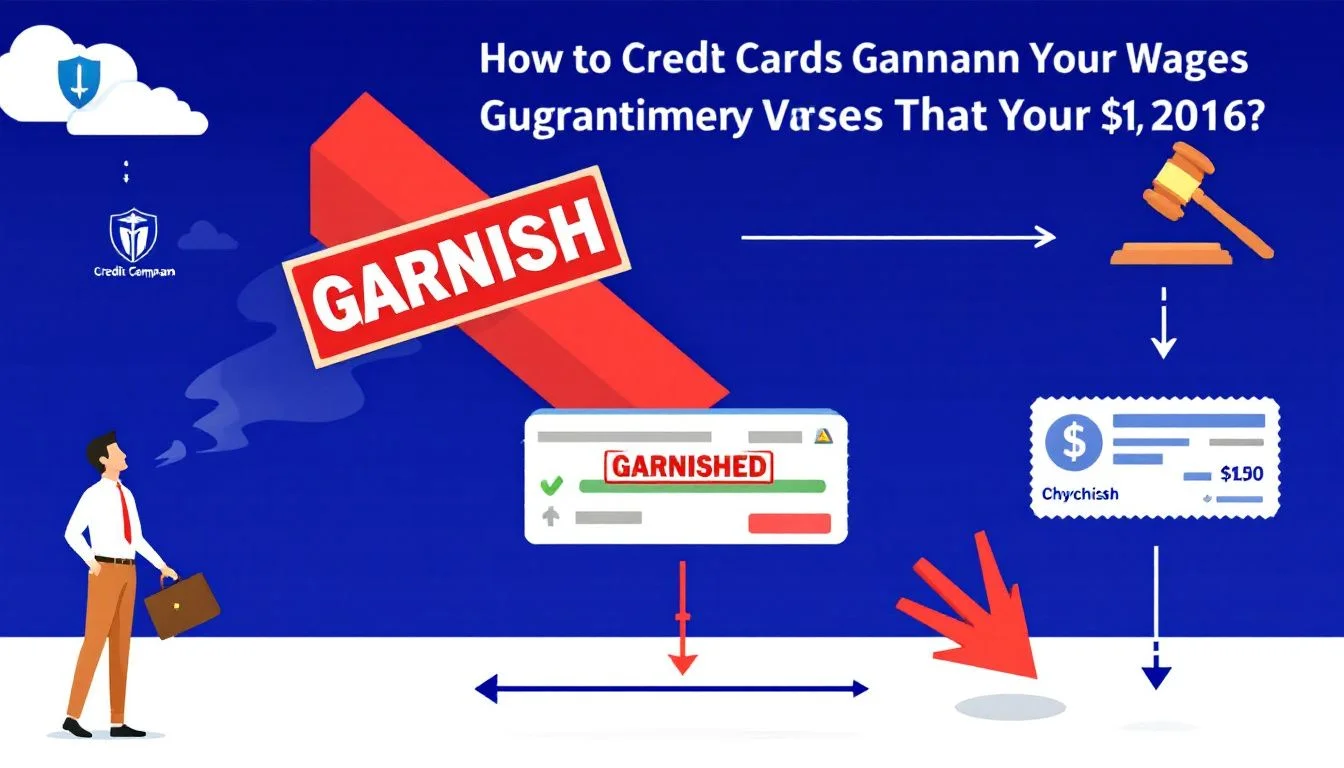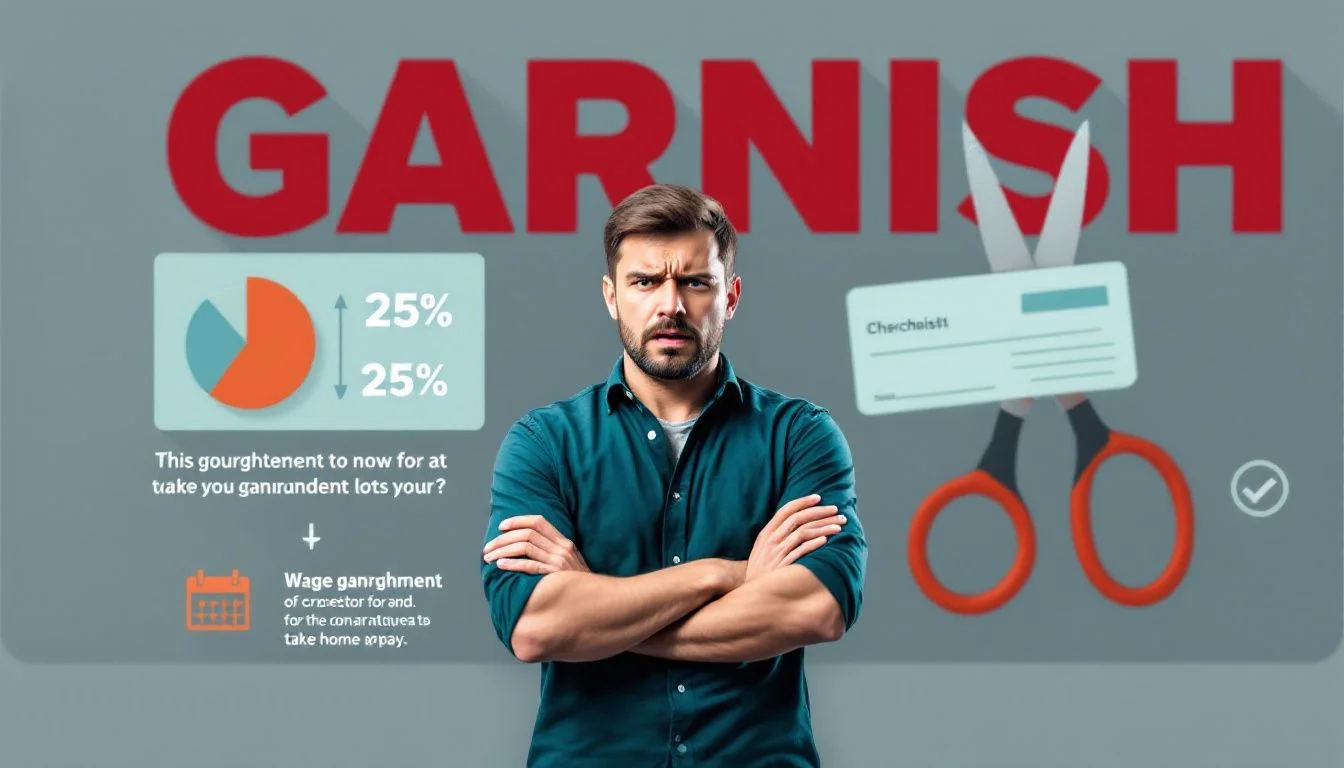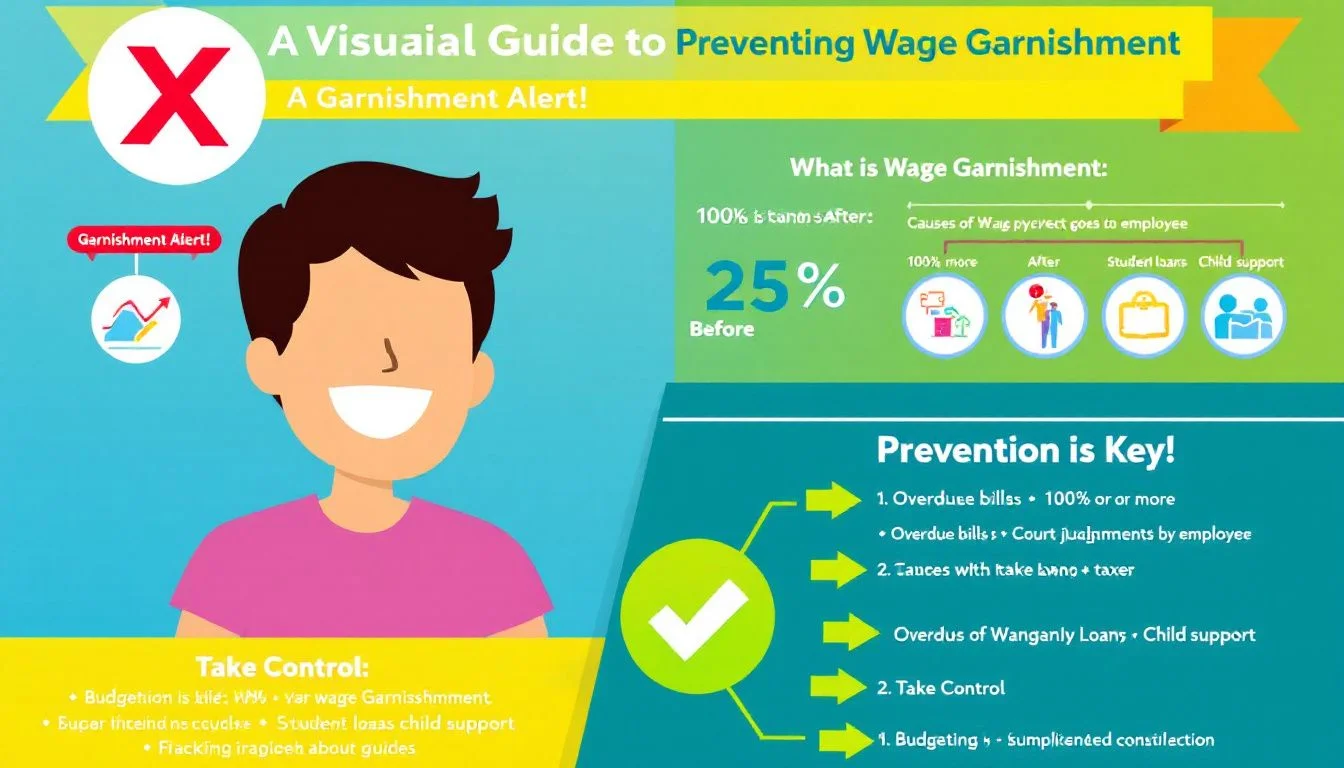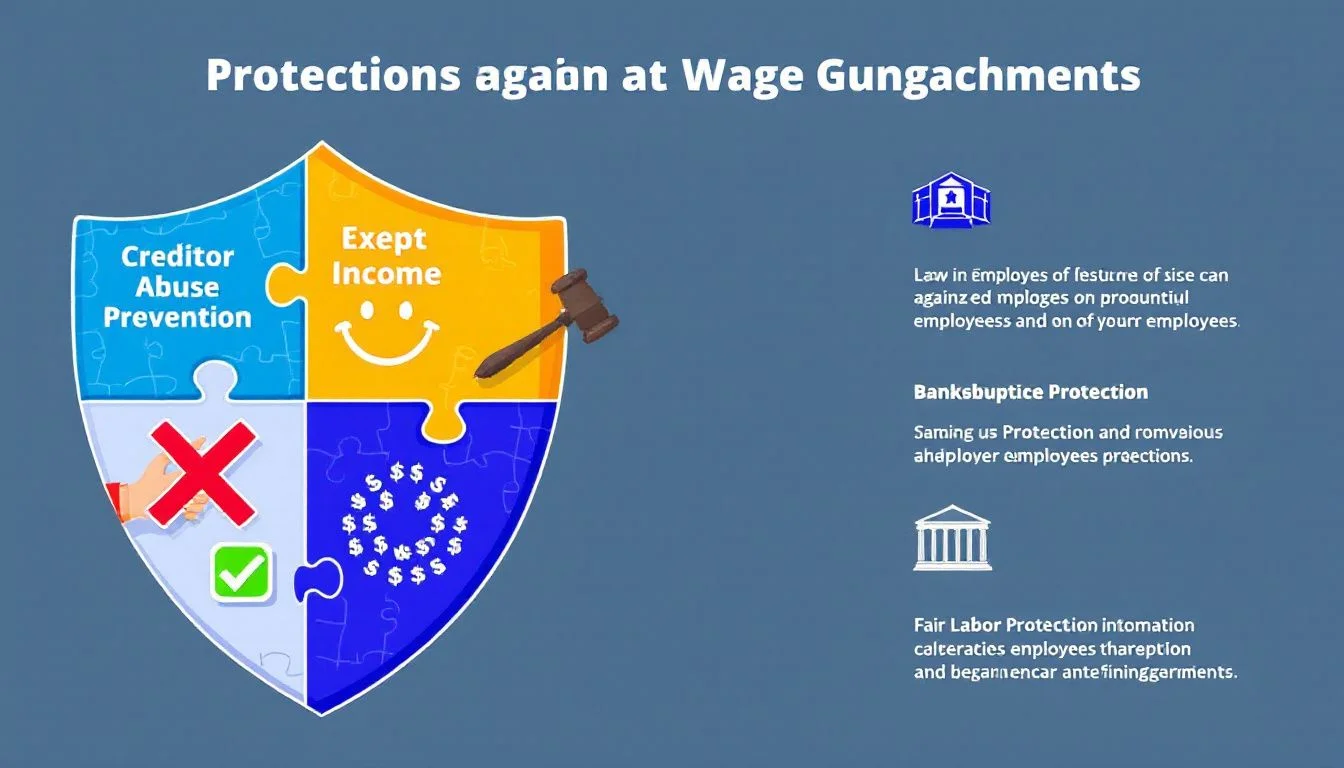Can Credit Card Companies Garnish Your Wages in Florida? What You Need to Know
Can Credit Card Companies Garnish Your Wages in Florida? What You Need to Know
Yes, credit card companies can garnish your wages, but only if they win a court judgment against you. This article covers what you need to know about the legal process in Florida and addresses the question: can credit card companies garnish your wages? It also explains how to protect your income.
Key Takeaways
- In Florida, credit card companies can garnish wages only after obtaining a court judgment against the debtor.
- The Consumer Credit Protection Act limits wage garnishment to 25% of disposable earnings or an amount exceeding 30 times the federal minimum wage, whichever is lower.
- Individuals facing garnishment should proactively negotiate with creditors and can seek legal exemptions to protect their income.
Understanding Wage Garnishment in Florida
Wage garnishment is a legal procedure that mandates withholding part of a person’s earnings to settle a debt. This process can be initiated by various creditors, including credit card companies, but typically requires a court judgment. Once a garnishment order is issued, a portion of your disposable earnings—defined as earnings after mandatory deductions—can be withheld to repay the debt.
In Florida, knowing the specific laws governing wage garnishment is crucial, as state regulations can differ significantly from federal ones. For instance, wage garnishment can affect both private debts like loans and credit card bills, as well as public debts like taxes. This means that whether you owe money to a private creditor or the government, your wages could be subject to garnishment.
Wage garnishment continues until the total debt is fully repaid. This can have a long-lasting impact on your financial situation, so it’s important to be well-informed about your rights and obligations under Florida law. Grasping these nuances can help you better navigate wage garnishment complexities and take steps to protect your earnings.
Can Credit Card Companies Garnish Your Wages?
When it comes to credit card debt, many people wonder if credit card companies can garnish their wages. In Florida, the answer is yes, but it’s not as straightforward as it might seem. Credit card companies, as private creditors, can garnish wages if there is unpaid debt, but they must first obtain a court ruling in their favor. This means that the creditor must sue the borrower for delinquency, which can lead to a court judgment allowing for wage garnishment.
The legal process for wage garnishment begins with the creditor filing a lawsuit against the debtor. If the court rules in favor of the creditor, a garnishment order is issued, allowing the creditor to garnish wages to collect the debt. This process includes credit card companies, mortgage companies, and other private creditors who have obtained a court judgment.
Individuals facing potential wage garnishment should understand this legal process. Realizing that credit card companies can’t garnish your wages without a court order can provide peace of mind.
However, ignoring the problem won’t make it go away. If you’re behind on credit card bills, address the issue directly to avoid escalation to wage garnishment.
Limits on Wage Garnishment
While the prospect of wage garnishment can be daunting, there are limits in place to protect individuals from losing too much of their income. The Consumer Credit Protection Act (CCPA) ensures that a portion of your earnings remains with you, limiting the amount that can be garnished. Federal law caps the portion of wages that can be garnished for private debts at 25% of disposable earnings.
For consumer debt, including credit card debt, the maximum withholding is typically capped at 25% of disposable earnings or the amount exceeding 30 times the federal minimum wage, whichever is lower. This cap helps ensure that individuals still have enough income to cover their essential expenses.
However, certain types of debt have different garnishment limits. For instance, child support garnishments can take a higher percentage of your disposable income, and unpaid taxes can lead to garnishment of up to 50% of your earnings.
Additionally, if an employee’s disposable earnings are $217.50 or less per week during a pay period, no garnishment is allowed during pay periods. Knowing these limits can help you better prepare for and manage wage garnishment.
Consequences of Wage Garnishment
Wage garnishment can have significant consequences on your financial well-being. The most immediate impact is a reduction in disposable income, creating financial strain, especially for those already facing budgeting challenges. This decrease in income can make it difficult to cover essential expenses, leading to a cycle of financial instability.
While garnishments themselves aren’t listed on a credit report, the unpaid debts related to garnished wages can be reported by creditors, affecting your creditworthiness. Repeated missed payments can drastically lower credit scores, with negative marks remaining on credit reports for seven years. This can make it challenging to secure loans or credit in the future, further complicating your financial situation.
The long-term financial strain caused by wage garnishment can be overwhelming. Addressing the root cause of the debt can prevent further garnishments and help you work towards financial stability. Being aware of the consequences can motivate you to take steps to manage your debt and avoid wage garnishment.
Preventing Wage Garnishment
Preventing wage garnishment often starts with early and proactive communication with creditors. Establishing a dialogue can help avoid the escalation to wage garnishment by negotiating a manageable repayment plan or settlement. Directly negotiating with creditors can often lead to more favorable terms and prevent the need for garnishment.
Working with a nonprofit credit counseling agency can also be beneficial. These agencies can facilitate negotiations with creditors and help you develop a debt management plan. Credit counseling services provide budgeting assistance and offer strategies to prevent wage garnishment, helping you stay on top of your financial obligations.
Taking these steps early can significantly help in preventing wage garnishment. By addressing the issue head-on and seeking help when needed, you can avoid the financial strain and long-term consequences associated with having your wages garnished.
Legal Protections Against Wage Garnishment
There are several legal protections in place to safeguard individuals from unfair wage garnishment practices. Certain types of income are exempt from garnishment under federal law and federal laws. This includes Social Security, federal benefits, Supplemental Security Income (SSI), and Veterans Affairs (VA) benefits. These exemptions help ensure that individuals relying on these benefits are not left without essential income.
The Consumer Credit Protection Act (CCPA) also provides protections, such as preventing an employer from terminating an employee solely because their wages are being garnished for one debt. Additionally, Florida Statute 222.11 allows individuals to file for exemptions to protect some or all of their wages from garnishment as “head of family”.
Claiming certain types of income as exempt can lessen the impact of wage garnishment. Understanding these legal protections can help you navigate the garnishment process and take steps to safeguard your earnings. Be aware of your rights and seek legal advice if you believe your wages are being unfairly garnished.
What To Do If Facing Wage Garnishment
If you find yourself facing wage garnishment, it’s essential to act quickly and take the necessary steps to protect your financial well-being. Start by reviewing the garnishment order and its documentation to identify any discrepancies that may warrant a challenge. Understanding the details of the order can help you determine if there are grounds to dispute it.
Negotiating with your creditor can also be an effective strategy. If negotiations fail, consider legal proceedings to challenge the garnishment. Filing for bankruptcy is another option that can provide immediate relief from wage garnishments, but it’s crucial to seek legal advice before pursuing this route.
Taking these steps can help minimize the impact of wage garnishment and provide a path to financial recovery. Address the issue promptly and seek professional help if needed to navigate the garnishment process.
How Wage Garnishment Affects Different Types of Debt
Wage garnishment can affect various types of debts, each with its own set of rules and limits. For instance, child support and alimony garnishments can take between 50% to 65% of an individual’s disposable income, depending on specific circumstances. This makes these types of debt a higher priority for garnishment compared to others.
Up to 15% of an individual’s take-home pay can be garnished for federal student loans. This garnishment may affect the individual’s overall financial situation. This is lower than the cap for consumer debt, which is typically 25% of disposable earnings. Credit card debt, while still subject to wage garnishment, is generally lower in priority compared to obligations like child support or tax debts.
Knowing how wage garnishment affects different types of debt can help you prioritize your financial obligations and take appropriate action. Each type of debt has its own garnishment limits and priorities, making it essential to be aware of the specific rules that apply to your situation.
Long-Term Impact of Wage Garnishment
Wage garnishment can have lasting financial consequences that extend beyond the immediate loss of income. One of the most significant impacts is on your credit score. Negative credit information, such as missed payments, can remain on credit reports for up to seven years, making it difficult to secure loans or credit in the future.
The reduction of income due to wage garnishment can also complicate long-term financial planning. It can lead to financial instability, making it challenging to save for future goals or emergencies. Consulting a financial advisor can help individuals develop a long-term plan to regain financial stability after facing wage garnishment.
Addressing the long-term impact of wage garnishment is vital for rebuilding your financial health. By understanding the consequences and seeking professional advice, you can take steps to recover and work towards a more stable financial future.
Seeking Professional Help
Seeking professional help is key to managing debt effectively and preventing wage garnishment. Legal professionals can assist in understanding local laws regarding wage garnishment and potentially challenge improper garnishment orders. Timely consultations with credit counselors or legal professionals can help individuals avoid further financial challenges related to wage garnishment.
Credit counselors provide strategies for debt management and help communicate with creditors to negotiate payment plans. Engaging with a certified credit counselor can facilitate negotiations and help you develop a debt management plan tailored to your situation, especially if a debt collector is involved.
Seeking professional help allows you to take control of your financial situation and work towards resolving your debt issues. Professional advice and support can make a significant difference in preventing and managing wage garnishment, helping you achieve long-term financial stability.
Summary
Understanding wage garnishment in Florida and its implications is crucial for anyone dealing with debt. From the legal process and limits on garnishment to the consequences and prevention strategies, this guide has provided a comprehensive overview of what to expect and how to protect yourself.
Taking proactive steps to prevent wage garnishment, such as negotiating with creditors and seeking help from credit counseling agencies, can make a significant difference in your financial well-being. It’s also important to be aware of the legal protections available to you and take action promptly if facing garnishment.
Ultimately, managing debt and avoiding wage garnishment requires a combination of knowledge, proactive measures, and professional help. By staying informed and taking control of your financial situation, you can navigate the challenges of debt and work towards a more stable and secure future.
Frequently Asked Questions
Can credit card companies garnish my wages in Florida?
Yes, credit card companies can garnish your wages in Florida, but they must first secure a court judgment. It’s important to be aware of your rights and the legal process involved.
What are the limits on wage garnishment for credit card debt?
Wage garnishment for credit card debt is generally limited to 25% of your disposable earnings or the amount that exceeds 30 times the federal minimum wage, whichever is lower. It’s important to know these limits to manage your finances effectively.
How can I prevent wage garnishment?
To prevent wage garnishment, it’s essential to negotiate with creditors early and set up a manageable repayment plan, possibly with the assistance of credit counseling agencies. Taking proactive steps can help you avoid this financial strain.
What are the legal protections against wage garnishment?
Legal protections against wage garnishment include federal exemptions for specific income types like Social Security and VA benefits, as well as state laws, such as those in Florida, that protect individuals filing as “head of family.” These protections help ensure that essential income remains accessible to those who need it most.
What should I do if I’m facing wage garnishment?
If you’re facing wage garnishment, it’s essential to review the garnishment order for any inaccuracies, negotiate with your creditors to reach an agreement, and explore legal options or bankruptcy if needed. Taking proactive steps can help you regain control over your finances.


